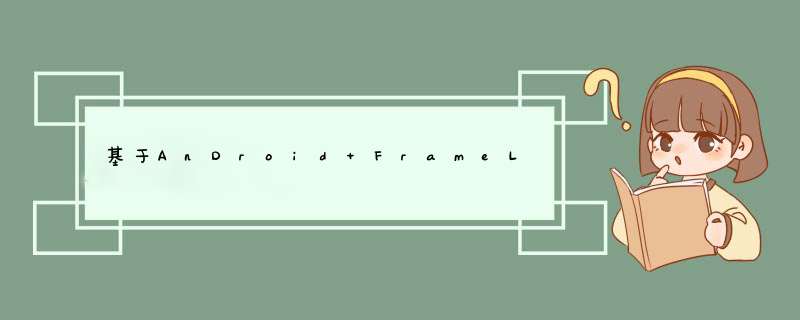
在FrameLayout中,用我看的书中的话说是,空间永远用不完。
复制代码 代码如下:
<?xml version="1.0" enCoding="utf-8"?>
<FrameLayout
xmlns:androID="http://schemas.androID.com/apk/res/androID"
androID:layout_wIDth="fill_parent"
androID:layout_height="fill_parent"
androID:background="#897753"
>
<ImageVIEw
androID:ID="@+ID/image1"
androID:layout_wIDth="fill_parent"
androID:layout_height="fill_parent"
androID:visibility="invisible"
androID:src="@drawable/sky"/>
<ImageVIEw
androID:ID="@+ID/image2"
androID:visibility="invisible"
androID:layout_wIDth="fill_parent"
androID:layout_height="fill_parent"
androID:src="@drawable/cloud"/>
<ImageVIEw
androID:ID="@+ID/image3"
androID:visibility="invisible"
androID:layout_wIDth="fill_parent"
androID:layout_height="fill_parent"
androID:src="@drawable/sun"/>
</FrameLayout>
其中,image1、image2、image3都是在同一块空间的。可以说它们是重叠着的,界面显示的是最近用的那一个。
在我的代码中把它们都先不可见。
在整体代码中实现的是点一下屏幕就换一张图片。
另外,我个人感觉,实现拖动效果的关键原理就是framelayout使得几部分空间的重叠。设置只有一部分可见。当拖动时,设置其他部分移动。
发现下载附近要扣e币,我把代码也贴上,图片可以换成自己喜欢的~
FramLayoutTestActivity.java
复制代码 代码如下:
import java.util.ArrayList;
import java.util.List;
import androID.app.Activity;
import androID.os.Bundle;
import androID.util.Log;
import androID.vIEw.MotionEvent;
import androID.vIEw.VIEw;
import androID.vIEw.animation.Animation;
import androID.Widget.ImageVIEw;
public class FramLayoutTestActivity extends Activity {
private String TAG = "FramLayoutTestActivity";
private ImageVIEw image1;
private ImageVIEw image2;
private ImageVIEw image3;
private List<ImageVIEw> List;
private int count=0;
/** Called when the activity is first created. */
@OverrIDe
public voID onCreate(Bundle savedInstanceState) {
super.onCreate(savedInstanceState);
setContentVIEw(R.layout.main);
image1=(ImageVIEw)findVIEwByID(R.ID.image1);
image2=(ImageVIEw)findVIEwByID(R.ID.image2);
image3=(ImageVIEw)findVIEwByID(R.ID.image3);
List=new ArrayList<ImageVIEw>();
List.add(image1);
List.add(image2);
List.add(image3);
}
@OverrIDe
public boolean ontouchEvent(MotionEvent event) {
// Todo auto-generated method stub
if(event.getAction()==MotionEvent.ACTION_DOWN)
{
Log.i(TAG,"move---");
showImage();
}
return super.ontouchEvent(event);
}
private voID showImage()
{
image1.setVisibility(VIEw.VISIBLE);
count=count%3;
for(ImageVIEw i:List)
{
i.setVisibility(VIEw.INVISIBLE);
}
List.get(count).setVisibility(VIEw.VISIBLE);
count++;
}
}
main.xml
复制代码 代码如下:
<?xml version="1.0" enCoding="utf-8"?>
<FrameLayout
xmlns:androID="http://schemas.androID.com/apk/res/androID"
androID:layout_wIDth="fill_parent"
androID:layout_height="fill_parent"
androID:background="#897753"
>
<ImageVIEw
androID:ID="@+ID/image1"
androID:layout_wIDth="fill_parent"
androID:layout_height="fill_parent"
androID:visibility="invisible"
androID:src="@drawable/sky"/>
<ImageVIEw
androID:ID="@+ID/image2"
androID:visibility="invisible"
androID:layout_wIDth="fill_parent"
androID:layout_height="fill_parent"
androID:src="@drawable/cloud"/>
<ImageVIEw
androID:ID="@+ID/image3"
androID:visibility="invisible"
androID:layout_wIDth="fill_parent"
androID:layout_height="fill_parent"
androID:src="@drawable/sun"/>
</FrameLayout>
总结
以上是内存溢出为你收集整理的基于AnDroid FrameLayout的使用详解全部内容,希望文章能够帮你解决基于AnDroid FrameLayout的使用详解所遇到的程序开发问题。
如果觉得内存溢出网站内容还不错,欢迎将内存溢出网站推荐给程序员好友。
欢迎分享,转载请注明来源:内存溢出

 微信扫一扫
微信扫一扫
 支付宝扫一扫
支付宝扫一扫
评论列表(0条)